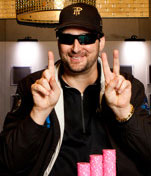-
Tunica Again
The World Poker Tour (WPT) recently visited to Tunica, Miss., and so did Phil Ivey and I. There was a $10,000 buy-in poker tournament being held at the Gold Strike Hotel and Casino, so Ivey and I charted a jet out of Los Angeles. The night before the buy-in, I was at Barona Casino in San Diego playing an Ultimate Blackjack Tour tournament. At 6 p.m., whilst debating whether to fly home, I felt compelled to go to Tunica. I’m not sure why I was pulled toward Tunica, but once the tournament began, I knew why I needed to be there. I was on top of my game, finally! I hadn’t been on top of my poker game since the World Series of Poker (WSOP) ended in mid-August.
Day 1 started a bit rough for me, as I was tired and sloppy with my chips. (I was playing too many hands.) The blinds were $100 to $200, and I was sitting at around $18,000 — we started with $20,000 — when the following hand came up. One player limped in under the gun, Player A limped in with 9-9, Player B — immediately to my right — made it $800 to go with Ad-As, and I looked down at 10-10. I called, and took a flop with three other players. The flop was Kd-10d-9c, and Player A bet out $2,000. Player B made it $7,000 to go, and I moved all-in for $17,400 or so. I told Ivey and Daniel Negreanu, who were sitting at the table next to me, “This could be the end of me.” I wasn’t kidding. I could not beat a straight (Q-J), or three kings, or I could have been at risk of losing to a flush draw. Player A called me quickly; Player B studied a moment, and then folded while showing the table his Ad-As. I now told Negreanu and Ivey, “Never mind, my opponent has only one win in the deck.” When the next two cards were 6d-4s, I became one of the early chip leaders with almost $45,000 in chips.
THE PLAY
Let’s take a closer look at the hand. I don’t mind Player A calling $200 with 9-9. However, a raise of some sort would have worked here just as well. Player B made a decent-sized raise with his A-A, and his play here was solid. As to my call with 10-10, my play was ideal. If I read Player B as being weak, then I could have reraised. If I read Player B as being strong, then a call works much better. I read him for strength, and I was right to merely call. Player B had a natural and easy call with his 9-9.However, if Player B thought that Player A was weak, and that I was weak, then he could have put in a big reraise trying to win the pot right then and there by forcing both of us to fold our hands. On the flop, I love the $2,000 lead out bet by Player A. Too often, players check the flop when they make a strong hand, when oftentimes the best way to win a big pot is to lead out with your strong hand. Mike “The Mouth” Matusow is great at leading out when he hits a flop hard, and it causes him to win some big pots here and there. In this case, leading out also makes more sense, as the board gives the possibility of a straight draw and a flush draw. Player B then made it $7,000 to go, and I hate his raise here. Why not simply call? In this case, I would have reraised, and Player A would have moved all-in, saving Player B $5,000 in chips. But this argument is playing the results. I like the call because the flop was so dangerous. Why put $7,000 out there, when the minute anyone calls you or raises you, you have to give up your hand? I like my move all-in for $17,400, although an argument could be made for me to just call the $7,000 bet. I mean, why scare everyone out of the pot by moving all-in, when you have such a strong hand? The argument for moving all-in is simple: with $19,000 already in the pot, I wanted to protect my hand from losing. I have no problem with Player A moving all-in here: I mean, there is no way that he could fold his three nines. After all, I could have had K-10 (top two pair), or the Ad-Jd (a big drawing hand), and even if I did have Q-J, then Player A was less than a 3-to-1 underdog. Player B actually had an easy fold with his pocket aces, even though he had the ace of diamonds. In fact, because he had the ace of diamonds in his hand, he could rule out either of us having the ace high flush draw, which was the most likely drawing hand: thus it was easy to imagine that Player A and I had super strong hands. I finished the day with $64,500 in chips.
You can fold pocket aces on the flop:
A) Never! (not a bad rule for rank beginners)
B) When there is a tough board, and mega action
C) Always (yeah, right!)
D) Not very oftenAnswers: B & D
Related Posts
- Wisconsin ‘Homeboy’ Poker
- Win the War, Not All the Border Skirmishes
- Rock Stars Can Play, Baby!
- Layne Flack’s Close Call
- Blind’ed at HSP
- Gold Wins (Most Of) Record-Breaking HSP Pot
- I’m a Lucky ‘Bad Boy’
- Protect Your Pocket Eights With A Raise
- A Dirty Win to Start the New Season
- Chan Versus Phil: All-In, All Out, All Over
Recent Posts
- WSOPE 2nd place finish
- Update from this years WSOP 2019
- Happy Holidays! Updated stock at Poker Brat, new book!
- Phil Hellmuth wins historic 15th World Championship!
- Final golden ticket winner coming soon
- Poker Brat – The Phil Hellmuth Jr. Autobiography
- Phil Hellmuth’s “Pokerbrat” – Coming soon to audio book!
- Poker Night in America – Sugar House Casino
- Sugar House w Matt Glantz
- Lost and found

 ™
™








